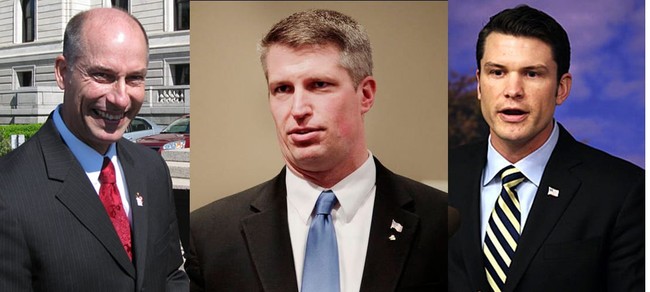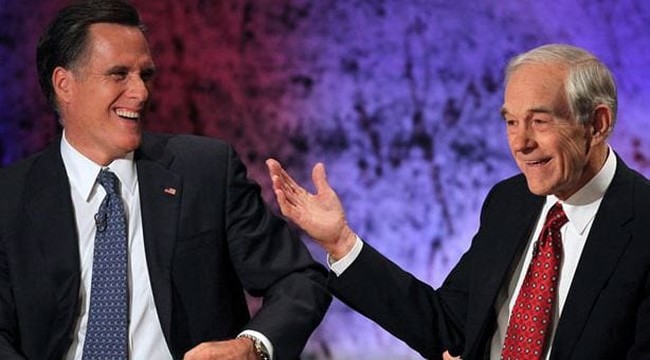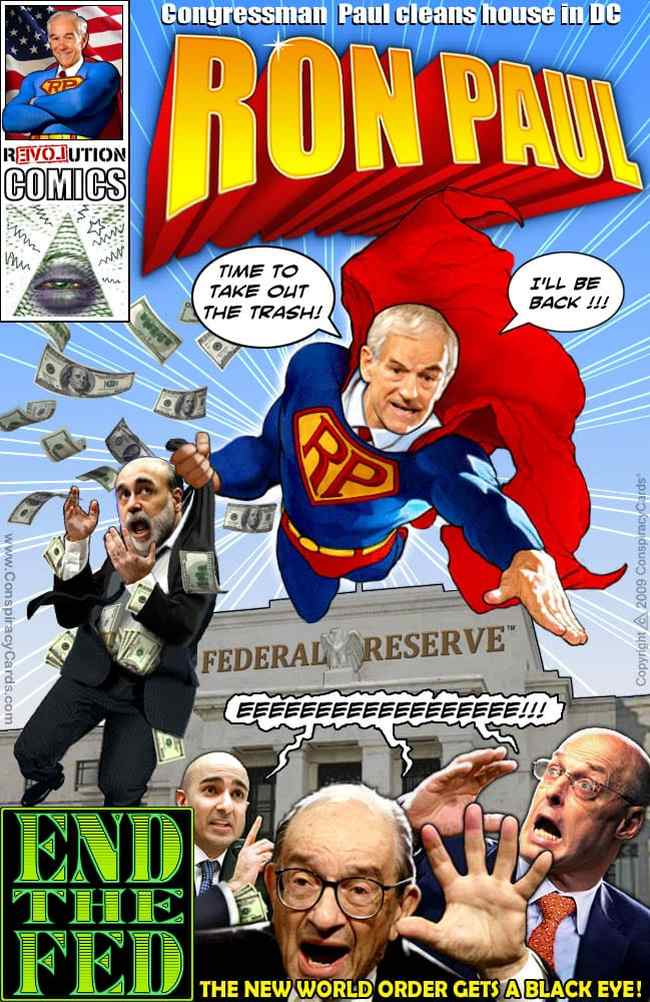This year’s election is for all the marbles. President Barack Obama, his administrative cronies, and his allied radicals on the Hill are hell-bent on continuing their “fundamental transformation” of America from a republic of law into a neo-feudal plantation. Most activists right of center understand the gravity of the situation and recognize a proverbial time for choosing.
However, there is another battle erupting within the Republican Party which is just as consequential. A civil war is taking place between established activists and new entrants rallied around Ron Paul. This battle for the soul of the party has the potential to leave both sides — and thus the party itself — in tattered ruins, accomplishing more than any leftist subversive could ever hope to.
A March caucus in Missouri turned into a scene of civil unrest as the temporary chair acted to thwart the Ron Paul organization. Chris Good reported:
“It’s like the Hatfields and the McCoys around here,” St. Charles County’s former GOP chairman told ABC News, after police arrived on-scene with a helicopter and removed Paul backers.
In Alaska, the state party has been under withering assault by the Ron Paul campaign, which has accused the former of administrative shenanigans intent upon disenfranchising those delegates supportive of Paul. The Alaska Dispatch reported in April:
[Evan Cutler, a Paul 2012 organizer for Alaska] echoed what the Paul for President campaign’s lawyer spelled out in an April 17 letter excoriating [longtime Alaska Republican Party chairman, Randy] Ruedrich for what amounts to party mismanagement that threatens to violate “rights of Alaskans to participate in the political process.” The letter, from David A. Warrington of the Virginia law firm LeClairRyan, takes Ruedrich to task for frustrating Paul supporters “at every turn” for not accepting checks, not promptly returning money orders, confusing credit card processing, and other alleged misdeeds.
The complaints swing both ways. ABC’s Jason M. Volack relayed:
… there are signs that Paul supporters are willing to make the nominating process messy.
They’re accused of muddying county conventions in Colorado and Iowa [in March].
In Iowa, a half dozen counties reported disruptions during conventions. The most egregious example occurred in Polk County, where Paul supporters illegally tried to become delegates.
“They were abrasive, offensive, and self-centered,” said Kevin McLaughlin, GOP chairman in Polk County.
In Colorado, Ron Paul supporters shouted down Denver County GOP Chairman Danny Stroud, demanding rule changes in favor of their candidate.
“A small, loud group attempted to hijack the assembly and trample on the rights of those who took time out of their busy lives to participate in the political process,” Stroud said in a statement to the Denver Post.
In Minnesota, Twin Cities conservative talk radio host Mitch Berg took to the air after being bumped from his local convention’s delegation by Ron Paul supporters.
I note with extreme irony that I, who ran two years ago for the CD4 executive offices as an insurgent, as a reformer, as someone who was there to change things up and bring things down to the grassroots, was being referred to as “the establishment” today in the convention.
Berg’s co-host, Hot Air’s Ed Morrissey, ran unsuccessfully for national delegate at Minnesota’s 2nd congressional district convention. The Ron Paul organization swept the state’s congressional conventions, picking up nearly all the national delegate and alternate spots in a rout which prompted one activist to tweet, “Ron Paul Libertarians took the Republicans out of the Minnesota Republican Party today.”
With rhetoric thus heated on both sides of the Ron Paul divide, many GOP activists are concerned about what kind of disruptions may be in store for the national convention in Tampa, and what kind of chaos might ensue when Mitt Romney officially secures the nomination.
Is unity possible? Only if both sides take full measure of the long-term stakes. Here are six steps toward reconciliation.
6 ) Reject the Cult of Personality
Ron Paul is going to die. Maybe not today, maybe not tomorrow, but sooner than later, the 76-year-old civil libertarian will be no more.
Does liberty die with him? Is Ron Paul the only candidate on the face of the earth qualified to advance libertarian principles? Is there a plan for a world without Paul?
These are questions which Ron Paul supporters need to ask themselves if they hope to affect policy in the long-term. Even in the campaign’s best case scenario, where Paul is the GOP nominee and defeats Barack Obama for the presidency, there’s still the Congress to contend with. Contrary to the behavior of the current administration, the president is not a king. Law still originates in the legislative branch. So what does a President Paul do with a lawmaking body that rejects his ideas?
If the “Ron Paul revolution” is indeed that, and not a movement of ideas with a serious strategy to affect real policy in the long-term, then it is little more than a cult of personality with limited political relevance. Worse than a waste, such an effort turns destructive as GOP activists committed to defeating Barack Obama are trampled in its revolutionary mosh pit.
5 ) Place Personal Integrity Above Political Victory
Integral to his liberty is a man’s word. Respecting the rights of others requires that you do what you say, that you honor agreements and uphold pledges. Participating in party politics involves the pledge to support the party’s platform and endorsed candidates. It is therefore incumbent upon true libertarians to do what they said they would do.
Too many Ron Paul supporters fail to recognize that their freedom to associate is a two-way street. A political party does not exist as a means to affect independent ends.
As an independent voter, you are at liberty to exercise your vote and apply your campaign support to whomever you like. However, when you make the decision to voluntarily associate with a political party, to become an officer or delegate, you pledge to support that party’s endorsed candidates. This does not make you a “party hack.” It makes you a guiding force poised to affect long-term change. You can still disagree with the party. However, the choice to participate in its processes is the choice to support its outcomes, whether you wholly agree with them or not. If you don’t like that, the honest choice is to not participate in the party.
Even so, withdrawing participation does not make strategic sense. In politics, support is currency. When you withdraw your support, you lose your currency and thus any leverage you had to affect change within the party. How does that advance your principles?
4 ) Commit to Long-Term Impact
There is a difference between a campaign and a movement. The objective of a campaign is to affect a specific political outcome, elect a candidate, pass an initiative, etc. The objective of a movement is to change political orientation. The latter is a far loftier goal than a single campaign can accomplish.
The progressive movement has been a multi-generational effort which began more than a century ago. While particular campaigns may have made great strides toward affecting progressive goals, no single campaign was a make or break moment.
The same will be true of the movement to combat progressivism. With that in mind, it is vital that its strategy contain long-term contingencies. Campaigns have an expiration date. Movements do not. Looking beyond the current campaign is essential, and requires fostering relationships and building coalitions around shared principles.
Political parties provide a ready-made infrastructure for fostering relationships and building coalitions. They are built to channel disparate ideas and efforts into a single platform and particular campaigns. While it is certainly true that principles are often diluted in this process, it remains the most effective means for actually changing policy. The goal of the liberty movement should therefore be to win a controlling stake within political parties and thus affect platforms, candidacies, and ultimately policy.

Candidates vying for the Republican endorsement for U.S. Senate in Minnesota. Dan Severson, Kurt Bills, and Pete Hegseth.
3 ) Because You Can Is Not a Reason
Is it asking too much to apply some level of discernment before wielding newly acquired power? This author serves as a volunteer on the campaign of Dan Severson for the Republican Party endorsement to challenge Minnesota’s U.S. Senator Amy Klobuchar. The story of that race is a case study in how the Ron Paul machine has overplayed its hand to the detriment of both itself and the party.
March saw the race for the endorsement completely upended. Severson was one of three candidates who had announced several months prior. The other two dropped out at the same time. Within a week of their departure, the race saw a new entrant in the person of National Guard Captain Pete Hegseth.
Hegseth’s announcement was the culmination of a lengthy draft campaign which laid groundwork for his entrance into the race while he completed a tour of duty in Afghanistan. The juxtaposition of Hegseth and Severson presented Republican delegates with a choice between a candidate whose background suggests political class grooming and a candidate who has long engaged both grassroots Republicans and the Tea Party.
Ron Paul supporters should find much to love in Severson’s stated positions. He is vehemently against Obamacare, SOPA/PIPA, and the controversial provisions of the NDAA. He has called for the elimination of entire federal departments, including education, energy, and the EPA. Severson wants to audit the Federal Reserve and move toward sound money. His stump speeches are punctuated with references to the Constitution, which he compares to the pre-flight checklist which kept him safe during his 22 year career in the Navy as a Top Gun fighter pilot.
Alas, rather than rally behind a candidate so oriented, the Ron Paul machine in Minnesota decided to pluck a first-term state legislator out of relative obscurity and piggy back his U.S. Senate campaign upon that of Ron Paul for president. Kurt Bills, said candidate, may be more faithfully attuned to the particular tastes of Ron Paul (he earned the congressman’s endorsement). But does that translate to being well-positioned to defeat a popular incumbent in the general election?
It seems that those running the Paul/Bills operation don’t particularly care. Ideological purity is valued above the practical consideration of finding a liberty-friendly candidate with appeal beyond the Paul echo chamber. Because Bills supporters are not content to get only most of what they want in a candidate, it seems increasingly likely that they will end up with nothing they want once votes are counted in November.
2 ) Embrace the Next Generation of Activists
Perceiving an onslaught of newcomers intent upon eviscerating the party in a vain attempt to advance a single campaign, many long-time Republican activists are up in arms. Legitimate concerns have in many cases festered into a blanket rejection of any Ron Paul supporter, sometimes excluding Tea Partiers or new activists of any stripe.
The GOP cannot afford to turn people away. Just as Ron Paul supporters must confront the fact of the congressman’s mortality, established Republicans need to confront the fact of their own mortality. None of us are getting any younger, and someone needs to carry on the good fight against the statists on the Left. Politics is a numbers game, and the GOP is in danger of losing by attrition.
Rather than brainstorming ways to keep new activists out of the party, leaders within the GOP ought to pick up where woefully inadequate public schools have utterly failed, and teach basic civics. As an activist in both the Tea Party and the GOP who is relatively new to both, I can attest to the difficulty of finding a path toward meaningful participation in the political process. The number one question asked at Tea Parties remains: What can we do? The answer can and should be provided by the GOP, to the benefit of each.
1 ) Build Coalitions Around Issues of Agreement
This advice swings both ways. There are an unfortunate number of Ron Paul supporters who vet other candidates with a Ron Paul litmus test that must be passed 100%. Don’t want to end the war in Afghanistan this afternoon? Warmonger! Don’t want to end foreign aid to Israel? Zionist! Don’t want to immediately decriminalize drugs? Tyrant!
More traditional Republicans get hung up in the same way. End the Fed? Quack! Bring the troops home? Isolationist! Reevaluate the drug war? Pothead!
In either case, folks tend to miss the forest for the trees. While disagreement on these and other issues is legitimate, and the consequences of policy in these areas should not be trivialized, we cannot afford to lose sight of the larger consequences if we allow division on these issues to split our forces in combat against the grand schemes of the Left.
Reagan’s oft quoted sentiment is nonetheless apropos:
If you agree with me 80 percent of the time, you’re an 80 percent friend and not a 20 percent enemy.
Whether you support Ron Paul or not, if you are a Republican, chances are you agree that the economy must be liberated from excessive taxation and regulation, that individual liberty and local control are under assault, and that spending must be dramatically and truly reduced. Why not unite on that?
Disagreements on more obscure policy aren’t likely to be settled in one election anyway. Legislators and executives are not kings. If something like the decriminalization of drugs is ever going to occur, it won’t be because one guy got elected. It will be the end result of a cultural sea change. In the meantime, one guy could be the vote that repeals Obamacare. You have to pick your battles.
The progressive movement has a 100+ year head start on our effort to combat it. In that time, the Left has already gone through the growing pains currently manifest within the Republican Party. They had their impractical radicals intent upon dramatic and abrupt revolution. They learned, as Van Jones put it, to “forgo the cheap satisfaction of the radical pose for the deep satisfaction of radical ends.”
In a similar way, today’s American patriot must learn to forgo the cheap satisfaction of a cathartic protest for the deep satisfaction of a significant political accomplishment. Only, we do not have a century to work with. Our learning curve must be dramatically reduced. We need to unite now!
Such unity is possible if we look to history and allow the experience of others to serve as a short cut. New activists must be integrated with haste. That will require humility and vision from all concerned, a willingness among the new to learn from the established, and a willingness from the established to mentor the new.












Join the conversation as a VIP Member